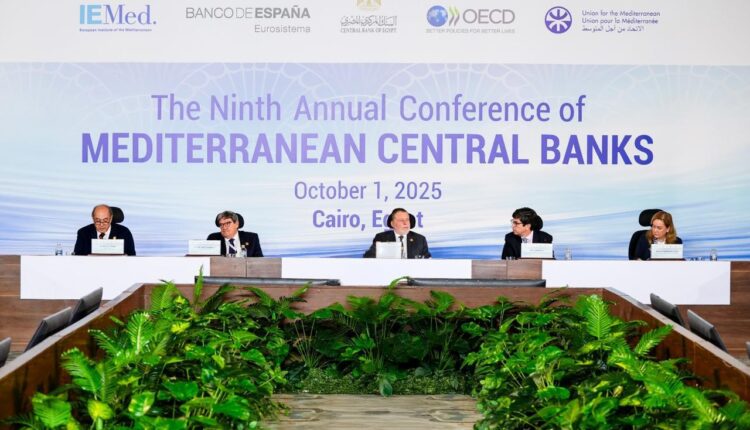Central Bank of Egypt Hosts the 9th Annual Conference of Mediterranean Central Banks in Cairo

In light of Egypt’s commitment to strengthening shared strategic relations with key development partners, the Central Bank of Egypt (CBE) hosted the 9th Annual Conference of Mediterranean Central Banks under the theme: “Harnessing Innovation and Integration for Sustainable and Inclusive Development in the Mediterranean Region” on Wednesday. The event brought together a number of Central Bank Governors from Euro-Mediterranean countries, alongside policymakers, economic experts, academics, and representatives of international financial institutions
The Conference was organized in collaboration with the Banco de España (BdE), the Organisation for Economic Co-operation and Development (OECD), the European Institute of the Mediterranean (IEMed), and the Union for the Mediterranean (UfM), serving as a vital platform for dialogue and cooperation among Euro-Mediterranean central banks to address economic and financial matters of both global and regional significance.
In his opening remarks, H.E. Mr. Hassan Abdalla, Governor of the CBE, welcomed participants from across the region, noting that hosting this substantial event reflects Egypt’s unwavering commitment to fostering collaboration and exchanging expertise to promote stability and prosperity across the region
Furthermore, Mr. Abdalla emphasized that this Conference represents a valuable opportunity to deepen cooperation among the Mediterranean countries, particularly in light of current circumstances that demand collective action to address shared challenges. He underscored that this year’s agenda tackles issues aimed at building a more resilient and prosperous economic future. The Mediterranean, which has long served as a bridge between people, cultures, and continents must now also evolve into a hub for innovation and resilience. Mr. Abdalla stressed that by working together, today’s challenges can be turned into opportunities to build a financial system that is more stable, inclusive, and sustainable
For his part, H.E. Mr. José Luis Escrivá, Governor of Banco de España, called for strengthening cooperation between central banks participating in the Conference “to continue building resilient financial systems that serve all segments of society.” He added that “it is precisely in times of uncertainty and division that the value of multilateralism becomes most evident. We must therefore not only preserve, but actively reinforce the multilateral system, ensuring it remains fit for purpose in a rapidly evolving world
Mr. Luiz de Mello, Director of the Country Studies Branch at the Economics Department of the OECD, emphasised that central banks have a key role to play in shaping the response to today’s challenges. Beyond maintaining monetary and financial stability, they are pivotal actors in supporting innovation, financing the green transition, and promoting inclusive growth. He acknowledged the importance of this dialogue, which is more important than ever for strengthening cooperation, building trust, and supporting sustainable growth at a time of global economic uncertainty and rapid technological change. He added, “As a trusted platform for policy dialogue, the OECD stands ready to continue supporting this dialogue and to work hand in hand with our partners to advance reforms and build more resilient, sustainable economies across the Mediterranean
Mr. Senén Florensa, Executive President of the IEMed, affirmed that “the Mediterranean faces the combined pressures of violent conflicts, global trade wars, debt crises, climate risks, and the challenge of achieving more inclusive and sustainable growth. These issues test our financial resilience and underline the importance of strong central banks that act as anchors of stability
H.E. Ms. Meltem Büyükkarakaş, Deputy Secretary General of the UfM, noted that the Mediterranean today is confronted with “geopolitical tensions, developmental gaps, social inequalities and the digital divide”. She stressed that unlocking the region’s potential requires advancing integration “driven by green and digital transitions”, adding that the UfM is determined to translate this vision into “concrete actions with tangible impact for the people of our region
The Conference featured four main sessions, the first of which was titled: “Artificial Intelligence, Central Banks and the Financial Sector,” moderated by the Governor of Banco de España. This session explored the growing role of artificial intelligence in reshaping the banking and financial sectors, with a focus on how to effectively harness its potential while managing the associated risks
The second session, titled “Financing for Sustainable Development,” was moderated by the Governor of the CBE. It focused on the role of central banks in fostering the green economy transition and channeling finance to support the sustainable development goals in the face of climate and environmental challenges
The third session, titled “Financial Inclusion for All,” highlighted various initiatives aimed at expanding the scope of financial services, as well as promoting economic empowerment and social equity for all segments of society, through innovative and inclusive solutions.
The fourth session, titled “Financial Integration,” discussed the OECD’s report on ways to strengthen regional integration, improve digital infrastructure, and achieve greater alignment between fiscal and monetary policies across the region
In his closing remarks, Mr. Abdalla expressed his sincere gratitude to all participants, commending the valuable discussions and constructive ideas shared throughout the Conference. He also affirmed that the outcomes of the Conference are a crucial step toward supporting financial stability, as well as promoting sustainable and inclusive development for the Euro-Mediterranean region
At the conclusion of the Conference, it was announced that the next edition will be hosted by Banco de España. It was also agreed that a technical preparatory meeting at the staff level will be held among the participating central banks four months prior to the Conference, aiming to promote stronger alignment, coordination, and the exchange of expertise among the relevant stakeholders







